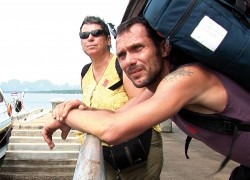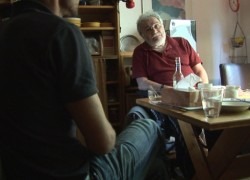In "Postcard to Daddy", Michael Stock documents how his father sexually abused him for years. The film asks big questions and finds answers in the family circle. Michael Stock even got his father in front of the camera.

"Postcard to Daddy" could have been anything: An indictment, a letter of protest, a lament. It has become a film about forgiveness, about (re)finding the person in the monster and trying to forgive him so that you can finally let him go. A gentle exorcism.
Michael Stock was sexually abused by his father between the ages of eight and sixteen. Neither his mother nor his two siblings knew about it.
Mum thought her youngest child's problems at school and personality changes were a normal part of puberty, while her older sister and older brother had long since become preoccupied with themselves and had withdrawn in disgust from their alcoholic father. This gave him unrestricted access to his youngest child.
In "Postcard to Daddy", Stock tells this story, but above all sets out in search of the foundations, background and consequences of his ordeal: Why did nobody notice anything? How did his parents' marriage work? Why does the brother still keep in touch with his father, even though he knows what he did to Michael? How does the sister develop a normal physical relationship with her own children?

The film deals with the big questions of guilt and atonement directly with those affected. Stock stays close to himself and his family with his camera. He travels with his mother to the mountains and to Thailand, where he has long conversations. He then wants to send the holiday video to his father in order to talk to him - hence the title "Postcard to Daddy".
And indeed: Michael Stock even got the father in front of the camera at the end of the film. Even in this conversation, he manages to remain calm and matter-of-fact, although the film as a whole is highly personal and emotional.
That is its great strength. A fictionalisation of the material would have called the story into question, and the viewer could have parked their horror in the shelter of art. In this documentary, however, escape is not possible. But it is also not necessary, because Stock does not want to hate and condemn, but to make it comprehensible.
This also applies to the fact that he contracted HIV in the wild Berlin gay scene in the early 90s. He had a lot of sex during this time and consumed a lot of drugs. Stock's first feature film "Prince in Hellland" was about this in 1993.

Today, at the age of 41, Stock can clearly state that his experience of abuse meant that for a long time he could only see himself as someone who made himself sexually available so that others could have fun with him. Protecting his health was not important to him. "It took me a long time to realise that sex was something I could control myself," he says. HIV was later joined by a hepatitis C infection.
Michael Stock dedicated "Postcard to Daddy" to his former partner Rémi, who was unable to come to terms with his difficult relationship with his father: He took his own life. Rémi is an example of all those who are unheard and misunderstood, for whom Stock also speaks in his film.
"Postcard to Daddy" received a lot of attention at this year's Berlinale, won several awards and was praised by audiences and critics as well as by organisations that help victims or perpetrators of child abuse.
Nevertheless, ARD has regrettably decided against broadcasting the film. Postcard to Daddy" has been showing in cinemas since last Thursday.
"Postcard to Daddy", by and with Michael Stock, D 2010, Edition Salzgeber
Homepage of the film









